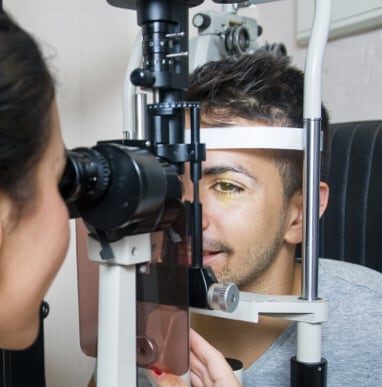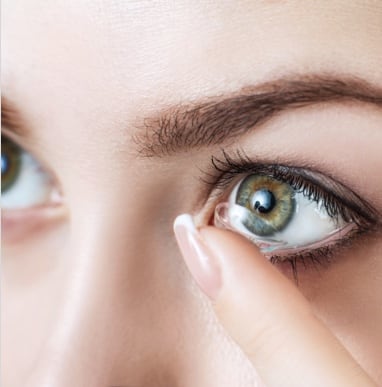Feeling unsteady or dizzy can be disruptive and make daily tasks like driving or cooking feel unsafe, but the cause isn’t always medical. Vision problems can cause dizziness from refractive errors to binocular vision dysfunction and convergence deficiency.
With a comprehensive eye exam, your optometrist can assess your vision, eye structures, and facial alignment to identify the underlying cause of your dizziness and provide effective treatment.
What Vision Problems Cause Dizziness?
Vision and balance are closely related, contributing to your ability to maintain stability and equilibrium. Your eyes work together with your inner ears, muscles, and joints to keep you steady and help you navigate your surroundings. If one part of this system isn’t functioning properly, it can cause dizziness or vertigo.
Refractive Errors
Refractive errors refer to conditions where the eye cannot focus on incoming light correctly. When your eyes cannot focus on objects properly due to nearsightedness, farsightedness, and astigmatism, it can cause blurred vision and eyestrain, leading to headaches and dizziness. Correction of your refractive error with glasses or contact lenses could help alleviate symptoms of dizziness.
Convergence Insufficiency
Convergence is the ability of your eyes to work together to focus on a nearby object. In convergence insufficiency, the eyes cannot perform this motion correctly, typically leading to double vision, headaches, and dizziness.
You may experience difficulty focusing on words or frequently lose your place while reading. Treatment for convergence insufficiency typically involves exercises and vision therapy to help strengthen the eye muscles.
Binocular Vision Dysfunction
Binocular vision is the eyes’ ability to work together to focus on an object as a team. Dysfunction occurs when the two eyes cannot work together properly, resulting in double vision, eye strain, and headaches. Binocular vision dysfunction can also affect the balance system, leading to dizziness, vertigo, and difficulty with spatial orientation.
Common examples of such disorders include:
- Amblyopia (lazy eye)
- Strabismus (crossed eyes)
- Diplopia (double vision)
Vertigo
Vertigo is a sensation of dizziness characterized by a spinning feeling. It can be caused by inner ear problems that affect your balance. Often, it is accompanied by symptoms such as:
- Nausea
- Ringing in the ears
- Hearing problems
However, some vision problems can also cause vertigo, such as vertical heterophoria, a visual misalignment that causes headaches and dizziness.

What Else Can Cause Dizziness?
Dizziness is a common condition that most people have experienced at one point in their lives. It is a feeling of lightheadedness, unsteadiness, or loss of balance. Sometimes, it may be accompanied by:
- Nausea
- Sensation of fainting
- Feeling disoriented
Dizziness can be caused by different health conditions, lifestyle factors, medications, or environmental factors.
Inner Ear Problems
One of the most common causes of dizziness is inner ear problems, such as:
- Benign paroxysmal positional vertigo (BPPV)
- Meniere’s disease
- Vestibular neuritis
- Inner ear infections
Medical Conditions
Other conditions can contribute to the sensation of dizziness, including:
- Anemia
- Cardiovascular problems
- Carbon monoxide poisoning
- Dehydration
Low Blood Sugar
Low blood sugar, or hypoglycemia, can also cause dizziness, especially in people who have diabetes or are on medications that lower blood sugar levels. When your blood sugar levels drop, your brain may not get enough energy to function correctly, leading to dizziness, confusion, and weakness.
To prevent low blood sugar, make sure you eat regular, balanced meals that contain carbohydrates, proteins, and healthy fats. If you have diabetes, monitor your blood sugar levels regularly and adjust your medications.
Medications
Some medications can cause dizziness as a side effect, including blood pressure medications, antidepressants, antipsychotics, and sedatives. These drugs can affect the inner ear, the nervous system, or the blood vessels, leading to dizziness, vertigo, or lightheadedness.
Anxiety or Stress
Anxiety or stress can cause dizziness, especially if you are prone to panic attacks or have a phobia of certain situations (such as heights, crowds, or closed spaces). When you are anxious or stressed, your body releases adrenaline, increasing your heart rate and blood pressure, leading to dizziness, palpitations, and shortness of breath.
How to Treat Dizziness
Your visual system may need support to manage your dizziness symptoms. Vision therapy uses exercises, tools, and specialty lenses to retrain your binocular vision dysfunction or convergence insufficiency. Dizziness can result from:
- Concussions
- Strokes
- Traumatic brain injuries
- Neurological conditions
- Facial nerve problems
Address Dizziness with Vision Therapy
Dizziness and vision problems often go hand in hand, leading to discomfort and disrupted daily routines. Schedule a comprehensive eye exam at Vision Care Center for a binocular vision assessment to diagnose your vision alignment problems.
With the proper intervention, you can find relief from dizziness and its related symptoms for a higher quality of life.












